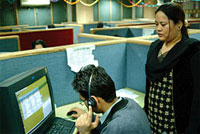 "Hello, may I speak to the business owner please? This is Sarah," says a sales agent using one of the many pseudonyms she uses to talk to clients halfway across the world. Sarah is among 200 young Nepali men and women at Serving Minds, one of the country's biggest call centres.
"Hello, may I speak to the business owner please? This is Sarah," says a sales agent using one of the many pseudonyms she uses to talk to clients halfway across the world. Sarah is among 200 young Nepali men and women at Serving Minds, one of the country's biggest call centres.
Re-launched in 2003, Serving Minds was Nepal's pioneering call centre and has become proof that Nepalis can compete with better-known businesses in other countries that serve clients in the globalised economy.
"We are more than a call centre," explains Serving Minds president, Ashish Kapoor. "We also serve all other needs of clients like customer acquisition, book-keeping, software development, maintenance and filing tax returns."
In fact, call centres aren't called call centres anymore. The preferred name is business process outsourcing (BPO) and because of the Information Technology revolution it can be located anywhere in the world where there is trained manpower. Serving Minds helps clients grow and expand their home markets anywhere in the world with most of their workforce located in Kathmandu.
Serving Minds has now become one of the largest employers of Nepali graduates. Starting with only six employees in 2003 Kapoor says it hopes to have 500 staff by next year and eventually about 1,000 people working in the soon to be completed premises near Soaltee Hotel. That facility will include a gym, recreation centre, 24-hour cafeteria and feature state-of-the-art technology.
"Nepal has the demographics of a mini-metro in India but with a higher unemployment rate among graduates," says Kapoor, "The level of English literacy is also the same if not better, so why not Nepal?"
Though one hears stories of sales agents being put through rigorous accent training to make them sound more 'American', this is not the case at Serving Minds. The accent is hardly important but confidence is considered an essential asset, says the company's human resources and administration manager, Chetna Shrestha. "Some of them acquire accents with the work they do, so it is not really a requirement," she says.
Staff are constantly evaluated to determine the promotions and benefits that each employee receives. But doesn't this produce a high-stress environment, with conditions in many BPOs in India and the Philippines now being described as "sweatshops"?
Kapoor responds with another question: "Which job is not stressful? And where do you not have to work hard to earn promotions? We have incentives and a work culture completely geared towards better performance."
So we asked one of Serving Minds' management trainees, Suran KC if he found it stressful. "There is a healthy competitive environment which makes us want to do better," he replied, "The pressure to improve performance is there but when you see your colleagues doing well you feel you can do better."
The BPO market in India is now a $5 billion a year annual industry with 2.5 million young college graduates employed in the sector. Boosting the purchasing power of millions of young people has actually transformed India's economy with a boom in sales of consumer goods and a whole new mall culture among Indian youth.
Kapoor thinks Nepal could easily cash in on the BPO boom just as India has. He adds, "I don't understand why people say Nepal can't compete in the global market. Our workforce here has been as competitive and competent as anywhere else in the world. It's all about the ability to serve efficiently and scale up to meet customer needs. The question: 'why Nepal?' shouldn't arise."
"Nepalis have excellent work ethics"
 Ashish Kapoor, president of Serving Minds, on some key issues facing this new industry in Nepal:
Ashish Kapoor, president of Serving Minds, on some key issues facing this new industry in Nepal:
On bandas
We have excelled in being able to work during bandas and other political upheavals. We have our own communications links, backup power and even our own water. We have few touch points with infrastructure in Nepal so we have been able to continue business without any hiccups. Also, our staff is very dedicated.
Employee turnover
Almost 70-75 percent of people do not stick to their first jobs for longer than a year. There are two reasons for this- one, you've never worked before and are still trying to find out what you want to do and two, you take a quick promotion and jump jobs. Most of our employees are first time jobholders and because we have a heavily geared performance oriented environment, for some it is a culture shock to work in such a demanding job.
Competing with Indian firms
We benchmark our standard with Indian business process outsourcers (BPOs). Our salary and working conditions are at par with them-it is only a short distance from Kathmandu to Delhi and we definitely don't want to lose our employees to better prospects there. So we have been able to maintain salary and career growth opportunities to match theirs.
Recruiting
Our recruitment processes are thorough. We have telephone interviews and discussion groups. We then have a final one-on-one interview. The candidates selected have to have important speaking and communication skills but we also look at EQ and IQ levels. The candidates selected are mostly graduates and we only take intermediate students if we find them to be exceptionally talented.
Nepali work ethics
The workforce here competes internationally. I don't understand when people say that the Nepali market can't compete worldwide. We are doing it and have very motivated and dedicated employees who have excellent work ethics.
 Suran KC, management trainee
Suran KC, management trainee
Suran KC, 23, is a management trainee for customer care in Serving Minds. A graduate from Nepal College of Travel and Tourism, she earns Rs 15,000 a month. "A friend of mine was working here. I saw an opportunity and took it. When I first joined, there were only about 40 people but now there are more than 200," says Suran. Her parents were concerned that she would be working late at night but once they saw the potential for career growth and the working environment, they got comfortable with the idea. Asked about the work environment, Suran says, "there is a lot of pressure working as an agent but I guess I did quite well as in about six months I was promoted to a sales supervisor". The best part of the job is the work environment, where everyone has become friends, she adds. " You come to office to meet friends and have a lot of fun while you work."
Shrijan Khadka, agent  Shrijan Khadka, 21, joined as an agent after getting a BBA from Kathmandu University and earns around Rs 7,500 a month. "I wanted to join earlier but due to the late-night shifts, I wasn't able to arrange time as it would have hampered my college work," he says. What drew him to Serving Minds is the chance to talk to people from other countries, which he feels will help to build up his confidence and communication skills. His family completely supported his decision. Shrijan is sold on the performance-geared work environment but says it's not easy. "It gets harder as you start becoming better at the job. If you want to work you need to have the courage to succeed as it is so competitive." Asked if he plans to stay at the job, Shrijan replies: "I haven't decided as yet. For now the work circle and environment is really good and you get to meet a lot of people."
Shrijan Khadka, 21, joined as an agent after getting a BBA from Kathmandu University and earns around Rs 7,500 a month. "I wanted to join earlier but due to the late-night shifts, I wasn't able to arrange time as it would have hampered my college work," he says. What drew him to Serving Minds is the chance to talk to people from other countries, which he feels will help to build up his confidence and communication skills. His family completely supported his decision. Shrijan is sold on the performance-geared work environment but says it's not easy. "It gets harder as you start becoming better at the job. If you want to work you need to have the courage to succeed as it is so competitive." Asked if he plans to stay at the job, Shrijan replies: "I haven't decided as yet. For now the work circle and environment is really good and you get to meet a lot of people."  Reshma Gurung, assistant sales manager
Reshma Gurung, assistant sales manager
A BBS graduate from Shanker Dev Campus, Reshma Gurung, 26, earns Rs 15,000 a month as an assistant sales manager at Serving Minds. She has been with the firm for about two years and before that worked in medical transcribing businesses in Nepal and India. After realising that she was tired of working in India, Reshma saw the perfect opportunity at Serving Minds. "It's fun and I don't remember the work pressure so much. The people are just so friendly and helpful," she says. Asked if it is different than her work experience in Delhi, she replies, "I think in terms of salary and work environment and professionalism, it is exactly the same if not better than the workplaces in Delhi."


